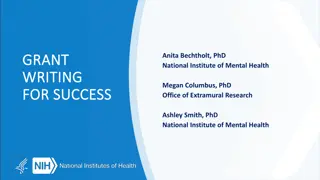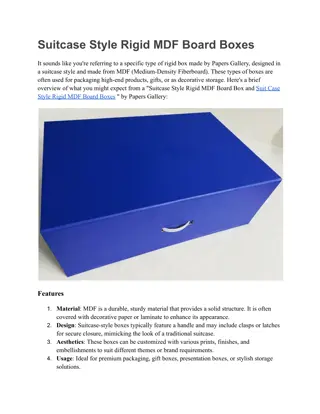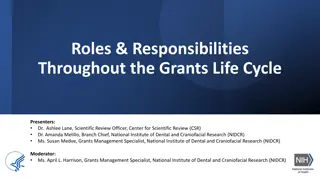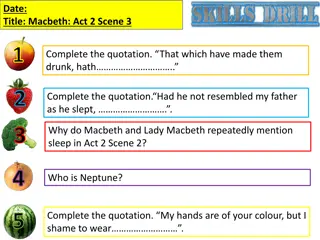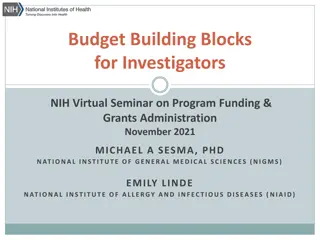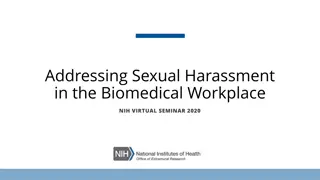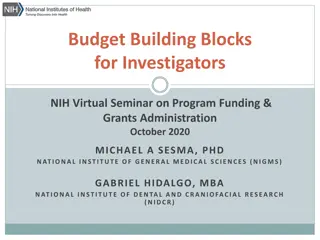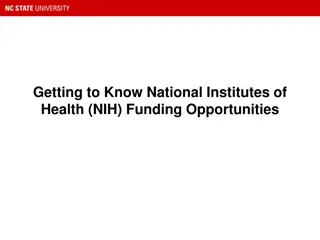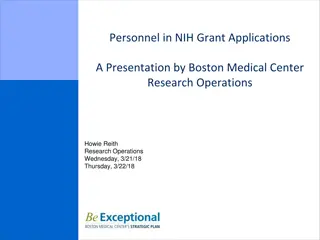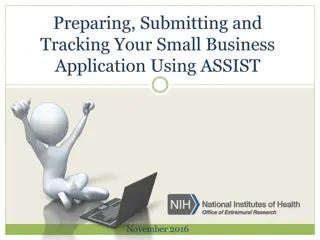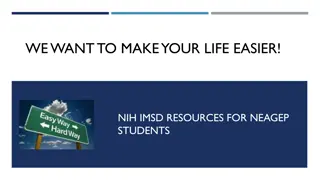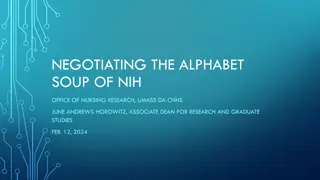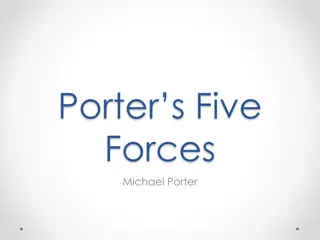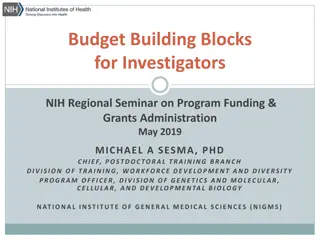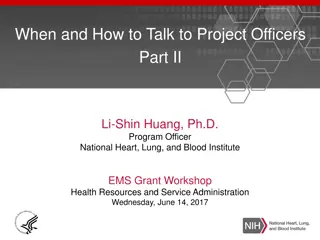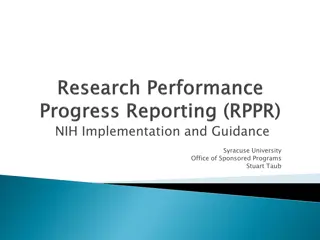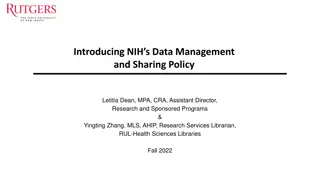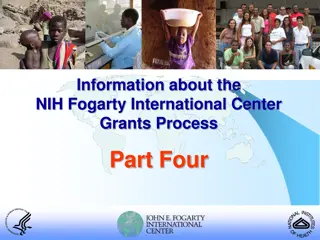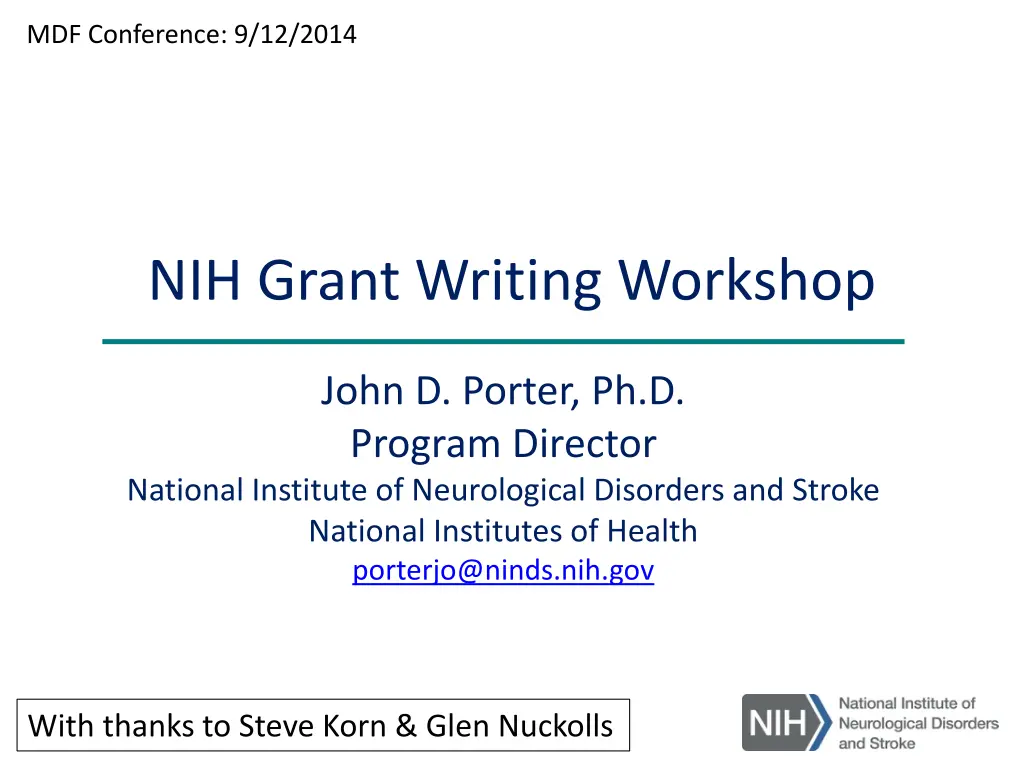
Understanding NIH Grant Application Processes and Key Contacts
Learn about the intricacies of NIH grant application processes, key individuals to collaborate with, and essential steps for successful grant writing. Gain insights from NIH Program Directors, navigate grant funding procedures, and ensure compliance with NIH grant policies.
Download Presentation

Please find below an Image/Link to download the presentation.
The content on the website is provided AS IS for your information and personal use only. It may not be sold, licensed, or shared on other websites without obtaining consent from the author. If you encounter any issues during the download, it is possible that the publisher has removed the file from their server.
You are allowed to download the files provided on this website for personal or commercial use, subject to the condition that they are used lawfully. All files are the property of their respective owners.
The content on the website is provided AS IS for your information and personal use only. It may not be sold, licensed, or shared on other websites without obtaining consent from the author.
E N D
Presentation Transcript
MDF Conference: 9/12/2014 NIH Grant Writing Workshop John D. Porter, Ph.D. Program Director National Institute of Neurological Disorders and Stroke National Institutes of Health porterjo@ninds.nih.gov With thanks to Steve Korn & Glen Nuckolls
Take Home: The 100 Cardinal Rules for Writing an NIH Grant Application* Rule #1: Talk with your NIH Program Director before preparing your application Rule #100: Talk with your NIH Program Director before preparing your application *if you want to succeed
NIH 101 (Basics) NIH: 27 institutes and centers (ICs); IC Program Directors are the interface point (filter & facilitate) Most NIH grants are competitive, investigator-initiated (80% of NIH budget) Review at each of 2 levels (Study Section & Council) is by true peers with decisions based on outcome of peer review Main DM-funding ICs, NINDS & NIAMS, are pay line ICs IC pay lines vary, based on funding strategy & funds available (see IC websites) (NINDS FY2014 pay line: 14th percentile) NIH institutes that are current funders of DM: NIAMS, NINDS, NIGMS, & NHLBI
NIH 101 (Processes) National Institutes of Health Center for Scientific Review Research Grant Application Assigns for Review Study Section Initiates Research Idea Submits Application Evaluates for Scientific Merit School or Research Center IC Evaluates for Program Relevance IC National Advisory Council Allocates Funds Conducts Research Recommends Action IC Director Takes final action for NIH Director
Who(m) to Talk with & When? Application Planning and Submission Study Section Review Council Review Grant Funding Ongoing Research SRO PD/PO GMO/GMS Scientific Review Officer (SRO) Manages, coordinates & conducts initial peer review Ensures fairness & administrative compliance of applications Prepares summary statements Grants Management Officer/ Specialist (GMO/GMS) Sets up & issues awards Interprets & ensures compliance with grant policies Reviews grant business activities Program Director/Officer (PD/PO) Advises on funding opportunities & requirements for applications Observes review meetings & interprets summary statements Approves funding & monitors scientific progress Anticipates future scientific directions, assesses research needs & opportunities
Just Who(m) AreMy People? The PO/PD for your area should be identifiable from NIH IC websites; reality can be hard to find, you can consult a funded colleague The SRO will be identified in your eRA Commons account when your application is assigned to an IC and study section (if you have questions about the SS assignment or about reviewers with potential conflicts, as soon as the SS assignment is made is the time to ask) The GMO/GMS will also be identified in your eRA Commons account
Whats Up with Funding Opportunity Announcements (FOAs) With NIH submissions, you must apply to an FOA (read it!) Types of FOAs Parent Announcements--generic Program Announcements (PA)--targeted Special cases: PAR & PAS Request for Applications (RFA)--targeted ThinkParent FOAs; getting too exotic may mean you don t understand what s competitive and/or are not a fit (very easy to fail) Alwaysconsult a PD/PO if you even think about an exotic FOA (there are opportunities if you understand) IC/Study Section assignments (cover letter)
Where to Find FOAs? NIH Office of Extramural Research Submission forms & cycles also found at this site (Forms & Deadlines tab)
Whats Already Funded/What Do Competitive Abstracts & Aims Look Like? For lists by disease: Google NIH disease dollars DM has its own category
Writing the Application Pay attention to the SF424 and FOA instructions (page limits, when to use an introduction, etc.); where applicable, pay attention to the new policy on resubmissions! See good tutorials at: http://www.niaid.nih.gov/researchfunding/grant/pages/aag.aspx Exude confidence if you don t believe in yourself (but don t over-do) Achieve clarity with brevity; but don t assume that the reviewer will get it Focus, focus, focus: over-ambitious & fishing expedition are easy kills for a study section member Descriptive is an easy kill: proposing testing of hypotheses! Synergy among aims, strong rationale & significance are all critical Preliminary data always essential (don t buy the not needed for R21 line; R01s need preliminary for every aim); NINDS & ESI/NI R21 recommendations Cover your bases on expertise document yours & collaborators Always have others read and red-mark your application; you re too close to it (your true friends leave the most red ink) Never argue with review on re-submissions you always thank them for their helpful insights Talk with your PD/PO early and often
Peer Review 2 stages: study section and Council Yogi-ism applies here: it s not over until it s over All your assigned reviewers won t be in your exact niche (& don t expect that) Summary Statement is the official transmission of outcomes Note this link on your Summary Statement: Next Steps: Visit http://grants.nih.gov/grants/next_steps.htm Your PO/PD will always try to listen to your review; best time to talk with them is after the Summary Statement is released by the SRO
Scoring & Pay Lines Scor e Additional Guidance on Strengths/Weaknesses Exceptionally strong with essentially no weaknesses Extremely strong with negligible weaknesses Very strong with only some minor weaknesses Strong but with numerous minor weaknesses Strong but with at least one moderate weakness Some strengths but also some moderate weaknesses Some strengths but with at least one major weakness A few strengths and a few major weaknesses Very few strengths and numerous major weaknesses Descriptor Criteria: significance, investigator, innovation, approach, & environment think like the reviewer in covering bases Criterion scores vs. impact score vs. percentile Pay line: IC-specific (on web IC funding strategy) Separate ESI/NI paylines, by IC HPP Exception al Outstandin g Excellent 1 2 3 4 Very Good 5 Good Satisfactor y Fair 6 7 8 Marginal 9 Poor Minor Weakness: An easily addressable weakness that does not substantially lessen impact Moderate Weakness: A weakness that lessens impact Major Weakness: A weakness that severely limits impact
Council 2nd level of review Expedited review at some ICs Non-percentiled applications Consideration of appeals (when/why on appeals?)
Im Funded, Now What? What the hell was I thinking when I wrote this? Deliver on what you proposed (publications), but also necessity of preliminary data for the renewal Annual progress reports ( type 5 s ) value in gauging progress toward the renewal Speed of the cycle 5 years of funding doesn t mean 5 years before writing the renewal (time to hire, time to complete work, publication lag, application deadlines it goes by fast!) Career mentor Lab management
Im Not Funded, Now What? You didn t talk with your PD/PO before? Now it s even more important Persistence Mentoring Exactly what did the reviewers say? Attention & responsiveness to critiques Revised or new application? Shotgunning vs. focusing
Talk with Your PD/PO Other Information Sources NIH Office of Extramural Research (http://grants1.nih.gov/grants/oer.htm) Application forms, deadlines, policies NIH Center for Scientific Review, Review Groups (http://public.csr.nih.gov/StudySections/IntegratedReviewGroups/Pages/default.aspx) FOA search, Study Section names, descriptions, & rosters NIAID Grant Tutorials (http://www.niaid.nih.gov/researchfunding/grant/pages/aag.aspx) NIH RePORTER (http://projectreporter.nih.gov/reporter.cfm) Funded grants search; lists of grants by disease category NIH IC funding strategies NINDS: http://www.ninds.nih.gov/funding/ninds_funding_strategy.htm NIAMS: http://www.niams.nih.gov/About_Us/Budget/funding_plan_fy2014.asp

